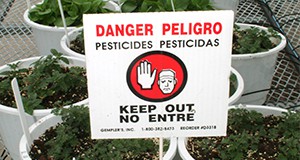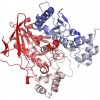
Pesticide poisoning is a commonly under-diagnosed illness. This five-page fact sheet describes how to recognize the early symptoms of pesticide exposure and provide basic first aid for the treatment of victims. This fact sheet explains how to provide initial treatment in the case of pesticide exposure on the skin, in the eye, through inhalation, and in the mouth or swallowed. Written by Frederick M. Fishel, and published by the Agronomy Department.
http://edis.ifas.ufl.edu/pi256
Tag: Pesticides and Human Health
Is Our Food Safe from Pesticides? (PI230)
 Growers of the food supply have adopted the use of integrated pest management (IPM) because it is no longer possible to rely solely on chemical pesticides to prevent unacceptable crop losses. According to the U.S. Environmental Protection Agency (EPA), IPM is the coordinated use of pest and environmental information and available pest control methods to prevent unacceptable levels of damage by the most economical means with the least possible hazard to people, property, and the environment. Scientific IPM strategies give the grower economic incentives for sustaining long-term crop protection with minimal disruption to the environment. The agricultural community typically will use pesticides sparingly as part of the IPM strategy whenever proven alternatives are not available for pest control. This 4-page fact sheet was written by Frederick M. Fishel, and published by the UF Department of Agronomy, March 2013.
Growers of the food supply have adopted the use of integrated pest management (IPM) because it is no longer possible to rely solely on chemical pesticides to prevent unacceptable crop losses. According to the U.S. Environmental Protection Agency (EPA), IPM is the coordinated use of pest and environmental information and available pest control methods to prevent unacceptable levels of damage by the most economical means with the least possible hazard to people, property, and the environment. Scientific IPM strategies give the grower economic incentives for sustaining long-term crop protection with minimal disruption to the environment. The agricultural community typically will use pesticides sparingly as part of the IPM strategy whenever proven alternatives are not available for pest control. This 4-page fact sheet was written by Frederick M. Fishel, and published by the UF Department of Agronomy, March 2013.
http://edis.ifas.ufl.edu/pi230
EPA’s Endocrine Disruptor Screening Program (EDSP) (PI227)
 People have asked questions in recent years concerning the effects that certain chemicals may have on the endocrine system of humans and wildlife. Laboratory studies have produced evidence that show various chemicals disrupt the endocrine systems of animals. Other evidence has shown that the endocrine systems of certain fish and wildlife species have been affected by chemical contaminants. Do some of these same chemical contaminants also affect the human endocrine system? Do pesticides cause these effects? The relationship between human diseases of the endocrine system and exposure to environmental contaminants is poorly understood and controversial. This 2-page fact sheet discusses the U.S. Environmental Protection Agency’s (EPA) screening program for potential effects to the endocrine system caused by pesticide exposure. Written by F.M. Fishel, and published by the UF Department of Agronomy, March 2013.
People have asked questions in recent years concerning the effects that certain chemicals may have on the endocrine system of humans and wildlife. Laboratory studies have produced evidence that show various chemicals disrupt the endocrine systems of animals. Other evidence has shown that the endocrine systems of certain fish and wildlife species have been affected by chemical contaminants. Do some of these same chemical contaminants also affect the human endocrine system? Do pesticides cause these effects? The relationship between human diseases of the endocrine system and exposure to environmental contaminants is poorly understood and controversial. This 2-page fact sheet discusses the U.S. Environmental Protection Agency’s (EPA) screening program for potential effects to the endocrine system caused by pesticide exposure. Written by F.M. Fishel, and published by the UF Department of Agronomy, March 2013.
http://edis.ifas.ufl.edu/pi227
Pesticidas y Colinesterasa (PI242)
 Esta publicación describe la colinesterasa, cómo varios pesticidas de diferentes familias pueden afectar los niveles de colinesterasa en los seres humanos; y la importancia del control oportuno de los niveles de colinesterasa de las personas que manejan pesticidas organofosforados o carbamatos que inhiben la colinesterasa. This 3-page fact sheet was written by Frederick M. Fishel, and published by the UF Department of Agronomy, October 2012.
Esta publicación describe la colinesterasa, cómo varios pesticidas de diferentes familias pueden afectar los niveles de colinesterasa en los seres humanos; y la importancia del control oportuno de los niveles de colinesterasa de las personas que manejan pesticidas organofosforados o carbamatos que inhiben la colinesterasa. This 3-page fact sheet was written by Frederick M. Fishel, and published by the UF Department of Agronomy, October 2012.
http://edis.ifas.ufl.edu/pi242
PI180/PI216 The Agricultural Health Study: 2008 Update
PI-180, a 2-page fact sheet by Frederick M. Fishel, summarizes the most recent findings from The Agricultural Health Study (AHS) in the following areas: pesticide residues in homes, pesticides and colorectal cancer, and pesticides and diabetes. Includes reference. Published by the UF Department of Agronomy, May 2009.
http://edis.ifas.ufl.edu/PI216